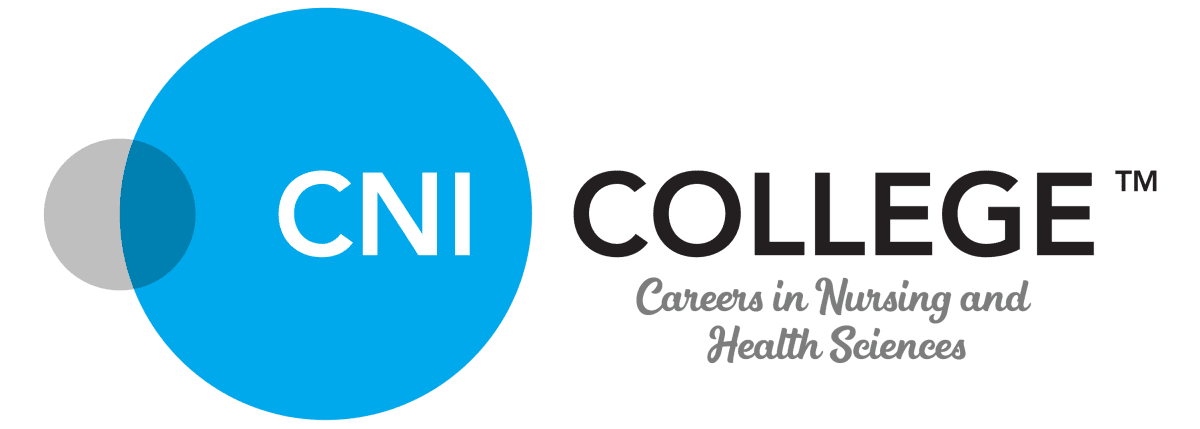RN to BSN Program in California
Flexible schedules and online course options help balance work and education.
Page Contents
Transforming Nursing Careers

The RN to BSN Program at CNI College is where your journey towards advanced professional nursing begins. This program is meticulously designed to emphasize evidence-based clinical practice and leadership, preparing you to excel in roles that demand critical problem-solving skills and expertise. You will delve into a world of new concepts and research-driven strategies, enhancing your practice and elevating the quality of care you provide. The program not only fosters your professional growth but also nurtures your individual development, making you more knowledgeable and autonomous in your nursing role. In a field where Bachelor-prepared nurses are increasingly in demand, this program is your gateway to making a profound impact on our profession, patients, and the broader community.
Overview of the RN to BSN Program
The RN to BSN Degree Completion Program at CNI College represents a vital step in addressing the community’s need for an educated nursing workforce. Crafted to be accessible online, this program aligns with the Essentials of Baccalaureate Education for Professional Nursing Practice as outlined by the AACN in 2008, ensuring graduates are prepared for professional practice. As a boutique institution, CNI College places a strong emphasis on the well-being of its students, offering a more intimate and focused learning environment. This approach not only facilitates deeper engagement with advanced education in sought-after health-related fields but also ensures a fulfilling and satisfying educational journey for every student.
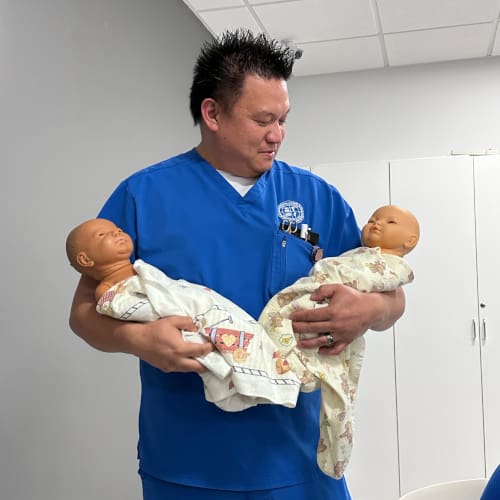
What the Program Offers
Tailored specifically for already licensed Registered Nurses, the RN-to-BSN program aims to expand upon their foundational Associate of Science or diploma education. This comprehensive program is rooted in a liberal education framework that leads to a bachelor’s degree. It focuses on cultivating essential skills such as organizational and systems leadership, critical for ensuring quality care and patient safety.
Students are immersed in the principles of scholarship for evidence-based practice and trained in sophisticated information management, along with the application of patient care technology. The curriculum also delves into the intricacies of health care policy, finance, and regulatory environments. A significant emphasis is placed on interprofessional communication and collaboration, skills crucial for enhancing patient health outcomes.
Additionally, the program covers clinical prevention and population health, instilling professionalism and professional values. Graduates of this program emerge as well-rounded, generalist nursing practitioners, equipped with a broad skill set and deep understanding, ready to excel in the dynamic field of nursing.
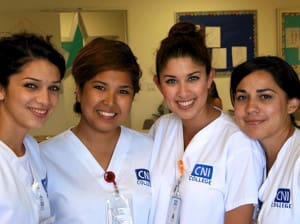
About CNI College
CNI College, located in Orange County, provides you with a full range of career training to help you succeed in some of the most desired health related fields.
quick links
CNI College Online Admissions Application
If You Are Ready To Get The Education You Need To Start Your Career In The Healthcare Field.
Primary Goals and Outcomes
The RN to BSN Degree Completion Program is meticulously designed with the primary goal of equipping students with advanced knowledge and professional nursing skills, essential for assisting patients and clients in achieving optimal health. The curriculum is crafted to prepare future BSN Nurses to adeptly navigate the complexities of the contemporary health care delivery system. Emphasizing ethical, culturally sensitive, and evidence-based nursing practice, CNI College is committed to fostering the development of nurses who are not only competent in their field but also dedicated to promoting human flourishing.
The program is guided by a societal vision that seeks health and well-being for all, encouraging the formation of morally reflective graduates who emerge as leaders and life-long learners. This comprehensive educational approach integrates critical thinking, decision-making, and leadership and management techniques, all underpinned by a strong foundation in moral, ethical, and legal principles, ensuring graduates are well-prepared to provide outstanding patient care in a variety of settings.
Program Structure and Duration

The RN to BSN program offers a streamlined and efficient structure, allowing students to complete their degree in just 12 months, equivalent to 50 weeks. Each segment of the program is thoughtfully designed into 10-week intervals, providing an intensive yet manageable learning pace.
Unique to this program is its blend of online coursework with a vital clinical component. Specifically, the NSG404 course includes a 90-hour direct care experience in the community, a requirement that not only enriches the student’s practical skills but also satisfies the Public Health Nursing (PHN) certificate requirement for the State of California.
It’s important to note that the overall program length may vary depending on the individual’s schedule. This comprehensive program encompasses 710 clock hours and is equivalent to 65.0 quarter credit units, offering a thorough and robust educational experience that prepares graduates for advanced roles in the nursing field.
Curriculum Overview
The RN-to-BSN Program stands out with its quarter unit system and intensive 10-week course structure, emphasizing a comprehensive blend of general education, science prerequisites, and advanced nursing studies. Embracing a philosophy centered around adult and collaborative learning, the curriculum is designed to leverage the rich experiences of learners, fostering self-direction and activity-centered education.
Key components of the curriculum include:
- Nursing theory
- Research
- Evidence-based practice
- Ethical and sociocultural considerations
- Leadership and management principles
The curriculum also integrates community health theory with practical application, allowing students to build on their existing RN knowledge and experience. This approach is facilitated by a faculty dedicated to connecting general education with nursing, creating an immersive learning environment that challenges conventional thinking and promotes forward-thinking in nursing practice.
Turn my Passion Into a Career
All fields required*
Course Highlights
Each course in the RN to BSN program is carefully designed to equip students with the essential knowledge and skills needed for advanced nursing practice, blending theoretical understanding with practical application.
This course serves as an introduction for nurses transitioning into a baccalaureate degree, focusing on essential leadership qualities in the evolving global healthcare environment. It covers a range of topics, including nursing history, ethical and legal issues, professional roles, and cultural considerations. The course is offered online, providing flexibility and accessibility.
In this course, students explore cultural and ethical concepts crucial in healthcare. It emphasizes understanding ethical theories, diversity, transcultural nursing, and the impact of societal beliefs on nursing practice. Delivered online, the course comprises 60 theory hours.
- This course lays the groundwork for improving nursing practice and patient outcomes through informatics. It includes history, terminology, and the role of informatics in nursing professionalism and patient safety. The course is delivered online, offering a convenient learning platform.
- Designed to enhance students’ statistical interpretation skills, this course focuses on evaluating data in an information-driven environment. It emphasizes the conceptual use of statistics in healthcare, offered online for flexible learning.
Offering an in-depth study of physiological functioning variations, this course addresses changes in body systems and their impact on health. Key topics include cell functioning, genomics, and disease prevention, all delivered online.
This course examines health promotion concepts and their application in nursing. It covers assessment tools, lifespan interventions, and health disparities, focusing on promoting a healthier society. The course, delivered online, also explores technology use in health promotion.
Focusing on evidence-based practice, this course teaches the history, methodologies, and significance of research in nursing. It includes research critique and ethical considerations, with an emphasis on applying learning to various nursing specialties. The course is online-based.
This course delves into leadership and management principles in nursing. Topics include teamwork, communication, healthcare quality, and legal and ethical aspects, all crucial for effective nursing leadership. It is an online course, ensuring accessibility and convenience.
This course, pivotal for BSN degree aspirants, covers leadership qualities needed in the healthcare sector. It includes topics like role transition and cultural considerations. The course also features 90 hours of clinical experience in a community health setting, fulfilling the PHN certification requirement in California.
As the culminating experience of the RN-BSN program, this course allows students to synthesize and apply their accumulated knowledge through an evidence-based project in a nursing or healthcare area of interest. This course is also delivered online, marking the final step in the students’ educational journey.
Admission Requirements and Application Process

Understanding the requirements for the RN to BSN program is key to a successful application, as they ensure candidates are well-prepared and eligible for the rigorous and rewarding program ahead. Here, you’ll find information on eligibility for applying, designed to streamline your path to becoming a part of this transformative nursing program.
Eligibility Criteria
To be eligible for the RN to BSN Degree Completion Program, applicants must meet specific requirements, ensuring they are prepared for the academic rigor of the program. These requirements are outlined as follows:
- Must possess a clear and current California RN License.
- Minimum grade of “C” (2.0) in all degree requirement and nursing coursework, with a preferred GPA of 2.5 in nursing courses.
- Applicant’s Statement of Purpose.
- Personal interview (face-to-face, online, or conference call).
- Current certification in CPR.
- Recommended one year of work experience.
- Background Check conducted by CNI.
- Health clearance prior to enrollment.
Important Note: All enrolled students must maintain a current and unobstructed RN license in California throughout the program, especially for the practicum course and for degree completion. Failure to maintain a valid RN license can result in dismissal from the program.
Getting Started
Embarking on your educational journey with the RN to BSN Degree Completion Program at CNI College is a straightforward process.
- If you’re ready to join, you can begin by filling out the online application.
- For those who seek more detailed information about the program, a ‘Request Info‘ form is readily accessible, providing comprehensive insights and helping you understand how the program aligns with your career goals.
- If you wish to experience the campus environment and facilities firsthand, you can schedule a visit to CNI College through the visit form. This opportunity allows you to immerse yourself in the campus atmosphere, offering a glimpse into life as a part of the CNI College community.
Whether you’re prepared to apply, interested in gathering more information, or keen on visiting the campus, CNI College facilitates each step to ensure a seamless and informative experience.

Educational Excellence and Faculty

CNI College prides itself on educational excellence, supported by a faculty with expertise, dedication, and commitment to student success. Our instructors bring a wealth of knowledge and real-world experience, ensuring that the curriculum is not only academically rigorous but also relevant to the evolving demands of healthcare. This blend of education and faculty guidance equips students with the skills and confidence needed in their nursing careers and to make a meaningful impact in the field.
Faculty Qualifications
The program is supported by dedicated faculty members. Among them, six hold doctoral degrees, while three are master’s prepared, ensuring a high level of academic proficiency. All faculty members, except those teaching general education courses, are Registered Nurses with active licenses in the State of California, further underscoring their practical knowledge in the field. These faculty members are not only active in their nursing practices but also in teaching, contributing to the realization of the program’s goals and outcomes.
Clinical Preceptor
California State University
Theory Faculty
Azusa Pacific University, University of Phoenix
Theory Faculty
St. Matthew’s University School of Medicine, University of Massachusetts, Roosevelt University, Pepperdine University
Theory Faculty
Grand Canyon University
Theory Faculty
Capella University
Theory Faculty
University of San Francisco, Aspen University, California State University
Theory Faculty
Duke University
Theory Faculty
Grand Canyon University, L.I.U/C.W., Nassau Community College
Theory Faculty
Simmons University
Theory Faculty
South University, Salve Regina University
Student-to-Faculty Ratio
We maintain a student-to-faculty ratio that ensures personalized attention and a quality educational experience. For didactic courses, the ratio is one faculty member to twenty-five students, fostering an environment conducive to interactive learning and individualized support. This commitment to optimal class sizes extends to our specialized population-based nursing clinical preceptorship, where we also adhere to a one-to-twenty-five faculty-to-student ratio. This structure is designed to provide a focused and supportive learning experience, enabling students to gain practical skills and insights in a real-world setting under expert guidance.
Career Preparation and Opportunities

Graduates of the RN-to-BSN program are prepared for advanced careers in the nursing field, building upon their existing credentials as licensed Registered Nurses. The program’s comprehensive curriculum equips students with essential skills in organizational and systems leadership, pivotal for ensuring quality care and patient safety. Emphasis on scholarship for evidence-based practice, coupled with advanced knowledge in information management and patient care technology, positions graduates at the forefront of nursing practice.
Aligned with the Essentials of Baccalaureate Education for Professional Nursing Practice, the program ensures that its graduates are not only ready for current nursing roles but are also prepared to lead and innovate in the healthcare sector. The particular emphasis on “Information Management and Application of Patient Care Technology” underlines the importance of technology in enhancing patient care, further broadening the scope of career opportunities for students in this dynamic and evolving field.
Clinical Experiences and Training
The RN to BSN program offers a clinical experience through its NSG 404 Population-based Nursing course, a key component designed to enhance students’ expertise in population-based nursing. This clinical lab course is an integral part of the curriculum, providing students with 90 hours of precepted practice in public and community health settings. This hands-on experience is crucial for developing advanced skills in real-world environments, allowing students to apply their theoretical knowledge to practical scenarios.
Additionally, the course includes seven hours of specialized training in child abuse and neglect, a vital aspect of public health nursing. This training not only enriches the students’ understanding of critical healthcare issues but also ensures their eligibility for the California Public Health Nursing (PHN) certification upon graduation. This combination of practical training and specialized instruction prepares students comprehensively for the demands and challenges of modern healthcare, particularly in public and community health domains.
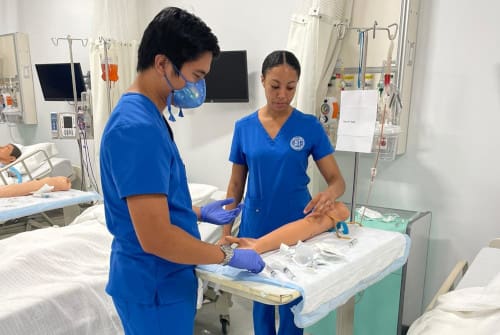
Job Placement and Career Support
At CNI College, we are committed to providing comprehensive support services to enhance the educational journey and career success of our students in the RN to BSN program. Our support system includes a wide array of services such as:
- Library and technology support
- Distance education assistance
- Research guidance
- Admission and advising services
- Financial aid counseling
Recognizing the impact of personal challenges on academic success, the Student Services Department offers a list of resources and referrals for students facing personal issues. Moreover, students in need of personal counseling have the opportunity to consult with the Dean or Associate Dean of Nursing, who can refer them to appropriate community services and resources.
The Career Services team at CNI College works with students throughout their entire program, preparing them for real-world experiences in the nursing field. This continuous engagement reflects in our completion rates, which was 89% in 2023.
To further validate our commitment to student success post-graduation, Career Services conducts employment verification for all graduates, requiring employers to return an Employee Verification form after a graduate has been in their position for at least 15 days. This process has yielded outstanding employment rates of 96% in 2022 and 87% in 2023. Looking ahead, we aim to enrich our understanding of our graduates’ career progress by inquiring if they have changed positions or received promotions following the attainment of their BSN degree, underlining our dedication to their ongoing professional development.
Financial Information and Support

At CNI College, we understand the importance of financial support in pursuing educational goals, particularly in healthcare professions. To this end, we offer comprehensive financial aid services and advising right from the admission stage. Our Financial Aid Department, led by a team of qualified directors and staff, is dedicated to providing detailed information about financial aid criteria and responsibilities to students aspiring for a career in healthcare. Additionally, our admission advisors, who are responsible for program enrollment, are regularly trained and updated through department and team meetings. This training ensures they are well-versed in the specific requirements and opportunities in the nursing field, enabling them to guide students effectively through the enrollment process and into a career in nursing.
Program Distinctions and Student Life

Completing the RN-BSN program at CNI College is more than just an academic achievement; it’s a pivotal step towards further educational advancement, particularly as a gateway to a Master of Science in Nursing degree. Alumni benefit from a familiarity with CNI College’s leadership, faculty, and extensive clinical network, an invaluable asset in their continued professional development.
CNI College distinguishes itself by offering advanced education in highly sought-after health-related fields within the nurturing environment of a boutique school. This focus on student well-being translates into an attentive and concentrated educational setting, designed to maximize student fulfillment and satisfaction. Here, students are not just numbers; they are part of a community where their academic and personal growth is prioritized, fostering a rich and supportive student life experience.

Program Accreditation
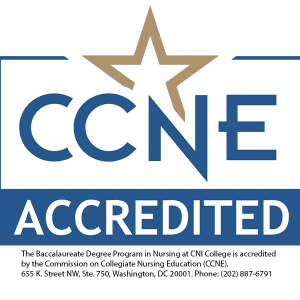
The Baccalaureate Degree Program in Nursing at CNI College proudly holds accreditation from the Commission on Collegiate Nursing Education (CCNE), a mark of excellence and a testament to the quality of education offered. This accreditation ensures that the program meets the rigorous standards set by CCNE, reflecting the commitment of CNI College to providing an educational experience that is not only comprehensive but also aligned with the highest professional standards. For students, this means the assurance of a curriculum that is both relevant and up-to-date, preparing graduates for successful careers in the dynamic field of nursing.
Campus Resources
CNI College offers a comprehensive educational environment with its expansive facility that encompasses approximately 52,000 square feet. This space is thoughtfully divided into classrooms, laboratories, and office areas, designed to facilitate a diverse range of programs. The college is equipped with state-of-the-art medical and nursing simulation laboratories, skill-based laboratories, and computer labs. Additionally, an on-campus library is readily available to all students during college hours, providing a wealth of resources and a quiet space for study and research.
Beyond the physical resources, CNI College supports its students through various services including:
- Career Services
- Student Services
- Financial Aid Advisors
- Registrars
- IT Department
- Student Success Center
- Administrative Staff
The Campus Library and Librarian are accessible daily, and students can also utilize the Library Information Resources Network (LIRN) online library database. The LIRN Virtual Library Collection offers an extensive range of academic resources across various disciplines, supported by a Consortium Librarian Service available for student inquiries. Additionally, students have access to the St. Joseph Burlew Medical Library for further research and study.

The Student Union, with its vending machines and lounges, provides a comfortable space for relaxation and dining, emphasizing a clean and smoke-free environment. Ample parking and 24-hour security ensure a safe and convenient campus experience. All these resources and services are detailed during orientation, ensuring students are well-informed from the start of their educational journey at CNI College.
